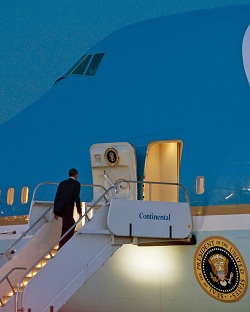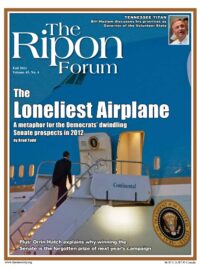
It’s 231 feet long, weighs 800,000 pounds, and was once considered the most potent political weapon in a campaign for the United States Senate. It’s Air Force One, the Boeing 747 that ferries the President on the campaign trail.
Previously, Democrat and Republican politicians hip-deep in races of their own have clamored to get their district or state on the travel schedules of incumbent Presidents of their party.
Air Force One brings the “million dollar photo op” – the President deplaning with his loyal local ally, not to mention an unmatched magnet for a fundraising reception and a rally that gets priceless live TV coverage.
In the 2002 mid-terms, pollsters identified discernible bounces to the lucky candidates hosting Air Force One, with the sugar high lingering for as much as a week. I remember an hours-long meeting with a campaign hosting Bush that year, trying to decide which lucky city in the state should get the world’s most famous airplane.
There are no such meetings happening among Democrats today, and that’s how you know Republicans are rolling toward the four-seat gain needed for a Senate takeover.
In the 2002 mid-terms, pollsters identified discernible bounces to the lucky candidates hosting Air Force One … There are no such meetings happening among Democrats today, and that’s how you know Republicans are rolling toward the 4-seat gain needed for a Senate takeover.
Democrats are defending more than twice as many seats this year as Republicans are, but the ratio is tilted more dramatically in seats that are closely contested. At most, it appears that 18 Senate seats could be in play and 13 of those are now Harry Reid’s votes.
It’s a truism in politics that wave elections are tidal – the outgoing wave will cover as much ground as the incoming version – and this year’s Senate class was created in 2006’s Democratic anti-war tsunami. Much like Republicans faced a disaster election in 1986 when the Reagan wave-riders came back on the ballot, Democrats have to be nervous defending Missouri Sen. Claire McCaskill, Ohio Sen. Sherrod Brown, and Montana Sen. Jon Tester. They all won as underdogs in 2006 and won’t have it easy going in their second lap.
Tester is perhaps in more peril than any other Democrat. Obama’s environmental policies have been toxic to Democratic politicians in the West and Tester is facing Rep. Denny Rehberg, who like Tester is already elected statewide. Even if Montanans still like them both on election day, it’s hard to see Obama – or his ally – winning in Big Sky Country this year.
McCaskill’s greatest vulnerability is the fact that she was one of the President’s earliest endorsers and she’s in a populist state the President may hardly contest. An astute campaigner, McCaskill won’t be counted out early against the winner of the GOP primary between Todd Akin, one of the House’s most conservative congressmen, 2008 gubernatorial primary loser Sarah Steelman and businessman John Brunner. The GOP field has yet to sort itself out with Steelman and Akin having viable regional bases and Brunner’s access to the most resources.
In Ohio, Brown has been polling very close to 50 percent – not bad for a first-termer in a swing state, but far from safe. Republican state Treasurer Josh Mandel, an Iraq War vet and a prodigious fundraiser, has cleared the primary field and will have ample time and resources to point out the disparity between Brown’s needle-pegging progressive politics with the average Ohioan’s more centrist leanings.
Nebraska’s Sen. Ben Nelson has long been the Democrat representing the reddest state and as a result, he’s drawn three name-brand challengers in Attorney General Jon Bruning, State Sen. Deb Fischer, and State Treasurer Don Stenberg, whom Nelson edged by two points in the 2000 Senate race. Early polling suggests that Nelson has a low ceiling and a high floor. Nelson’s best hope in this climate is the narrowest of wins, but he has to be considered a serious underdog, even as an incumbent.
Challenges to Democratic incumbents in Michigan, Florida, and Pennsylvania are progressing more slowly, but all three states will be key battlegrounds in the Presidential contests, and a polarized environment could provide lift to late-developing challenger campaigns.
Of the eight open seats, six are held by Democrats, and Sen. John Cornyn’s recruitment efforts as Chairman of the National Republican Senatorial Committee have put all six of them in play.
Of the eight open seats, six are held by Democrats, and Sen. John Cornyn’s Republican recruitment efforts have put all six of them in play.
The Virginia seat vacated by one-term Democrat Jim Webb is already a dead heat between two of the commonwealth’s best known politicians – former Governors Tim Kaine (D) and George Allen (R). Allen lost in 2006 to Webb when the GOP brand was at a low ebb in the swing suburbs outside Washington, DC, but since then under GOP Gov. Bob McDonnell, Republicans have surged in the region and observers in both parties expect the race to go down to the wire.
Republican Rep. Rick Berg will be favored in North Dakota’s open senate race – Democrats enticed the only serious player on their bench, former Attorney General Heidi Heitkamp, into running.
In blue Connecticut, both sides have a primary – Rep. Chris Murphy is the early favorite for Democrats while 2010 Senate nominee Linda McMahon is a heavy favorite over former Congressman Chris Shays based on her personal resources and ideological positioning to his right.
Both sides have contested primaries in the swing state of New Mexico, with Democratic Rep. Martin Heinrich considered a slight favorite over State Auditor Hector Balderas and former Rep. Heather Wilson favored over Lt. Governor John Sanchez on the Republican side.
The biggest surprise of last cycle came in Wisconsin, where businessman Ron Johnson entered the race late and knocked off liberal icon Sen. Russ Feingold. This year, Democrats have settled on the state’s most left-wing member of Congress, Tammy Baldwin of Madison. The best indicator of this race’s status is the fact that despite Wisconsin’s Democratic history, a large Republican field is assembled and still growing. The best known GOP candidates include: former Gov. Tommy Thompson, former Rep. Mark Neumann, and state Assembly Speaker Jeff Fitzgerald.
The sleeper race of the 2012 cycle may come as far from Washington as is possible – in Hawaii, where former Republican Gov. Linda Lingle, who left office with her popularity intact, is running against a Democratic field that includes Rep. Mazie Hirono and former Rep. Ed Case. The Democratic primary promises to be a divisive echo of the special election fracas that let Republicans win a congressional seat in 2010 – Case is a moderate Blue Dog Democrat while Hirono is more liberal – giving the pragmatic centrist Lingle a shot to give Republicans an historic win in the President’s home state.
As of this writing, only three Republican-held seats appear to be within reach for Democrats in even their best-case scenario.
Democrats have yet to entice a name-brand opponent for Rep. Jeff Flake in Arizona’s open Senate seat, and retired General Ricardo Sanchez (D) has shown no fund-raising prowess against Lt. Gov. David Dewhurst and other Republicans in Texas’s vacancy.
Of the three Republican incumbents, Democrats are most bullish about their chances with Harvard professor Elizabeth Warren against Sen. Scott Brown in Massachusetts and with Rep. Shelley Berkley against appointed Sen. Dean Heller in Nevada.
Democrats did get a recruiting coup in Indiana, where battle-tested Rep. Joe Donnelly, a rare survivor of the 2010 Republican landslide, is hoping that conservative insurgent Richard Mourdock, the State Treasurer, upends longtime Sen. Dick Lugar. If Lugar, long popular with independent Hoosiers, wins the nomination, the race will like fall off the board.

Of all the 18 states where Senate seats could be closely fought, the President will be an asset to Democrats in no more than five of them. Barring a dramatic turnaround, every time Obama’s plane touches down in the other 13 states, he will not find a red carpet on the tarmac.
Brad Todd is a Republican admaker and strategist who advised Sen. Ron Johnson, Gov. Rick Scott, the National Republican Congressional Committee and a dozen winning Republican Congressional campaigns in the 2010 election.




